Volunteer spotlight: Umme Kulsoom Arif
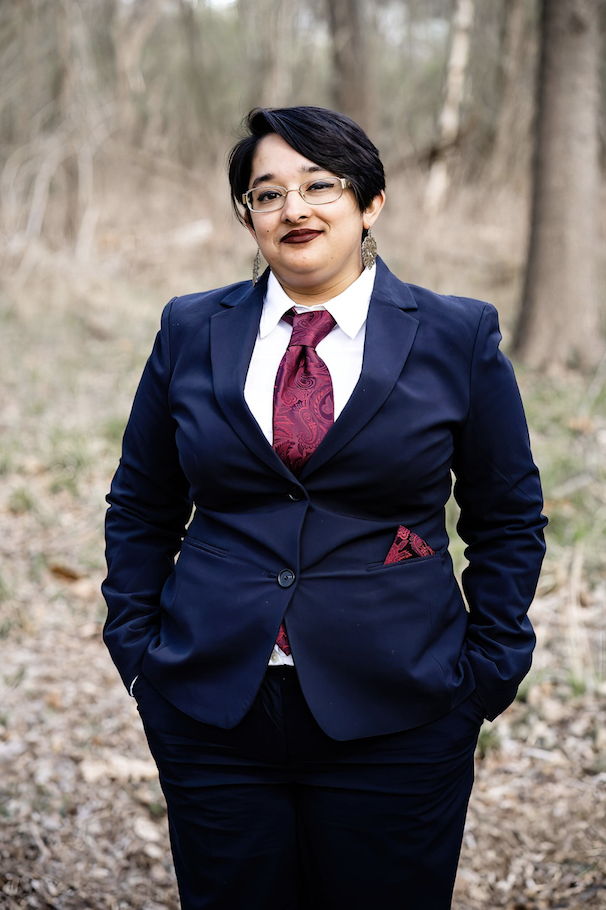
Umme Kulsoom Arif is a lawyer, activist, and sometimes writer from Missouri. They received their Bachelor of Science in Justice Systems from Truman State University and their Juris Doctor from Penn State Law in University Park. Despite having been born and raised as a part of the Dawoodi Bohra community, they did not become familiar with FGC until they were nineteen, when they learned that they had a much more personal connection to it than they could have anticipated. Umme volunteers as a writer for Sahiyo after joining the organization while in law school, telling their story and hoping to encourage others to do the same and find healing in speaking out. What was your experience of learning about female genital cutting (FGC) for the first time like? I had some passing understanding of what FGC was thanks to a mention of it by my high school sociology teacher, but I think I truly learned about the gravity of it and how connected I was to it a few years later. I was a sophomore in college and just coming to terms with my sexuality, leading to me coming out to my parents as asexual. That was when my mother told me that my fear of intimacy was intentionally done, and suddenly more than a few childhood memories that didn’t immediately make sense clicked. When and how did you first get involved with Sahiyo? I was in my second year of law school and had been watching the U.S. prosecution case until its devastating conclusion. While researching what advocacy groups were out there to help survivors like myself, in an effort to see if there was something I could do, I came across Sahiyo and — recognizing the name from my own culture — immediately reached out to volunteer. What does your work with Sahiyo involve? Mostly a lot of writing and blog posts! I’m very grateful to have been part of the 2022 Sahiyo Activists Retreat, and to be able to share my perspective as someone part of the LGBTQ+ community, especially as someone who is nonbinary. I’ve focused heavily on the healing side of activism and encouraging survivors to be kind to themselves, even if it isn’t easy. How has your involvement with Sahiyo impacted your life? Growing up as part of the Dawoodi Bohra community, speaking up against FGC has been a very strange and isolating experience. But being part of Sahiyo offered me the opportunity to find and build my own community of survivors and allies who are focused on uplifting each other and embracing our authentic selves. I’m much more comfortable writing about my experiences these days and often look forward to more opportunities to volunteer. It has been an incredible healing journey and I am so grateful to not walk this path alone. What words of wisdom would you like to share with others who may be interested in supporting Sahiyo and the movement against FGC? Come as you are and be yourself. Everyone’s healing journey is different and you do not have to push yourself beyond your limits to join the movement against FGC. Survival is activism too. And know that you do not walk this path alone — we are with you, to speak when you don’t feel able and to listen when you do.
Volunteer spotlight: Development intern Alyson Maye
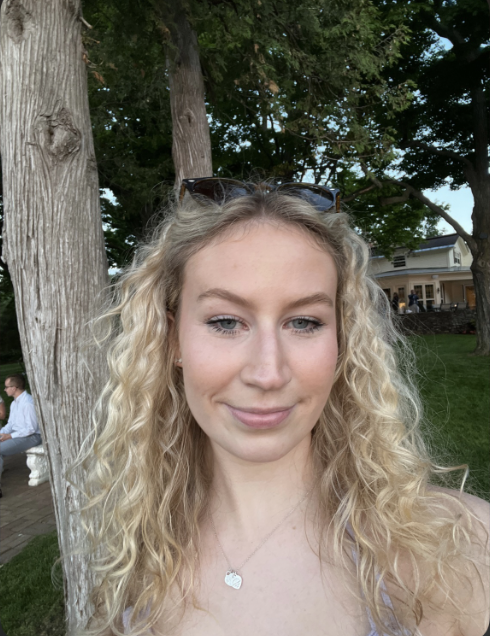
Alyson is an undergraduate student at Emmanuel College. Throughout high school, she gained a passion for learning about human rights. This passion continued into college and ultimately led her to pursuing a degree in International Studies with a concentration in Security and Diplomacy. She believes that in order to create a world where women are equal to men, we need to empower and provide safe environments for young women and girls to flourish. What was your experience of learning about female genital cutting (FGC) for the first time like? The first time I learned about FGC was as a sophomore in high school. In class, we read about the life of a young Nepali girl who was a survivor of FGC and child marriage. I did not learn much more about FGC until college. I have now learned the real impact FGC has on millions of young girls and women around the world. Once I started to learn more about the practice of FGC, I was shocked at how prevalent the issue is. When and how did you first get involved with Sahiyo? I first got involved with Sahiyo when looking for an internship. Throughout my search, I knew I wanted to work with an organization that makes a difference in the world. Sahiyo’s work is particularly important because it focuses on liberating young girls and women from FGC, which reinforces and upholds a patriarchy that is pervasive in many communities, particularly those that practice FGC. What does your work with Sahiyo involve? I work with Sahiyo as a Development Intern. The Development team works to research and apply for grants, as well as reach out to individual donors. This is an important component to the organization because it allows us to reach and support as many survivors of FGC as possible. How has your involvement with Sahiyo impacted your life? Working with Sahiyo, although for only a short time, has already had an impact on my view of FGC. I knew about the issue prior to starting my work with Sahiyo, however, working with the organization provides me an opportunity to see both what has been done to end the practice of FGC and areas in which more could be done to help those impacted by the practice. What words of wisdom would you like to share with others who may be interested in supporting Sahiyo and the movement against FGC Get involved in any way you can. Whether that be through volunteering, interning, donating, or participating in Sahiyo events. Involvement and awareness of the issue is how we can work to resolve it.
Volunteer spotlight: Development intern Anaïs Furukawa
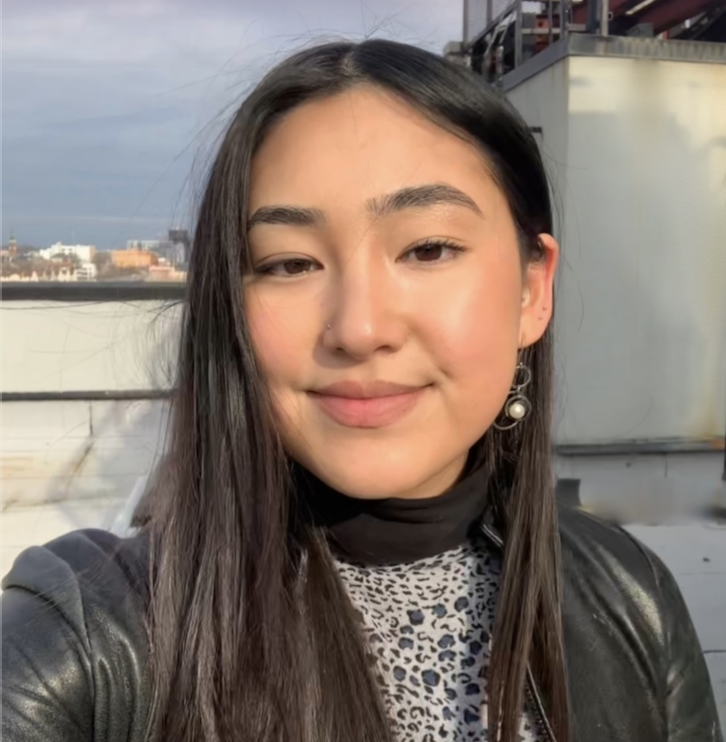
Anaïs’ deep interest in giving a platform to voices that need to be heard and stories that need to be told led her to pursue and earn her B.A. in journalism at California State University, Northridge. Her love of storytelling, and passion for strengthening communities, drives her desire to be a part of missions geared towards advocacy and powerful, culture-shifting work. What was your experience of learning about female genital cutting (FGC) for the first time like? Learning about FGC for the first time was an eye-opening experience. Despite FGC being a human rights violation, it’s a practice that many (myself included) aren’t very familiar with. I had a brief understanding of it before interning for Sahiyo. Realizing how prevalent it is in so many countries was heartbreaking, and had me questioning how it’s not a topic more frequently discussed. Sharing what I’ve learned with friends, and witnessing their reactions, reaffirmed the lack of public awareness surrounding FGC. When and how did you first get involved with Sahiyo? I got involved with Sahiyo in June 2022 after scouring the internet for an opportunity to apply myself to a mission geared towards advocacy and human rights. I found the internship post on LinkedIn, and immediately knew Sahiyo’s women-led, passionate team was one I wanted to be a part of. I was deeply interested in gaining a better understanding of FGC, and eager to get involved with an organization that was helping foster such important, powerful conversations. What does your work with Sahiyo involve? Being on the Development Team, conducting funding source research and assisting with any fundraising efforts/events make up most of my work. Consistently seeking out funding opportunities and maintaining relationships with existing and potential donors is critical to securing the financial support Sahiyo utilizes to continue making strides towards ending the practice of FGC. How has your involvement with Sahiyo impacted your life? Hands-on experience working towards such a meaningful mission has me further yearning for a more just society. Being a part of an organization that is tackling such an ambitious mission head-on, with such empathy, is inspiring. My involvement with Sahiyo has confirmed my desire to work towards healing injustices and strengthening communities, as well as given me a greater perspective on gender-based violence and how to navigate creating safe spaces that stimulate change. What words of wisdom would you like to share with others who may be interested in supporting Sahiyo and the movement against FGC No act of support is too small. Every conversation counts.
Research: The impact of integrating FGM/C within domestic violence support services
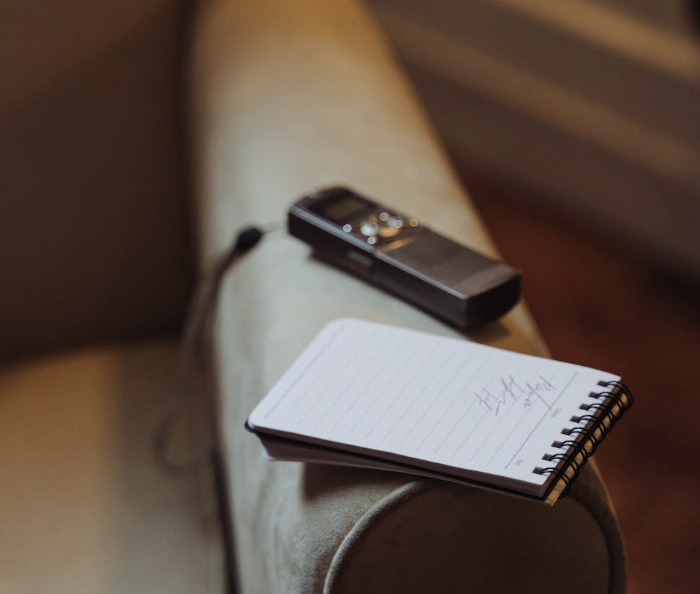
Volunteer spotlight: Jessica Ladi Ibrahim Puri
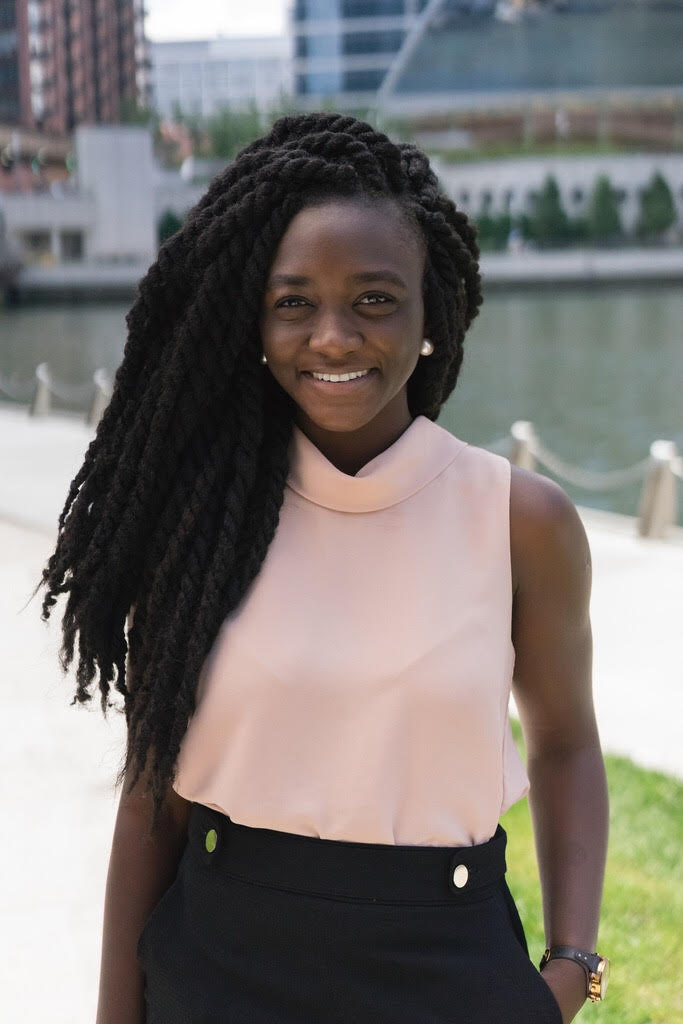
Jessica is a Ph.D. candidate at Feinberg School of Medicine, Northwestern University, and an instructor for Field Studies in Public Health at Northwestern University. She received a Bachelor of Science in Biology from Loyola University and a Master of Public Health from DePaul University. Jessica’s research interests are in adverse childhood experiences (ACEs) and gender-based violence. She volunteers as a writer and researcher for Sahiyo, serves on the steering committee for the WE STOP FGM/C Chicago initiative, and volunteers with Chi Alpha Campus Ministries at Northwestern and Loyola Universities. She is married to her best friend, who now finds himself talking about (female genital cutting) FGC with strangers on airplanes. What was your experience of learning about FGC for the first time like? Difficult. I grew up in Northern Nigeria, where I knew child brides, escaped religious wars, and survived typhoid and malaria several times. So it was shocking to realize I had missed something so persistent in my country. I learned about it through an article I read in a college course at Loyola University in Chicago. I was initially upset because I thought it was just another Western publication writing about how terrible an African country was. Then I realized it was written by scholars from the state I grew up in. Further conversations with my parents, aunts, and uncles confirmed that I had friends who experienced FGC. They were just too ashamed to talk about it on the playground. I decided from that time to work to create a safe space for survivors to thrive and for those at risk to grow in safety. When and how did you first get involved with Sahiyo? I connected with Sahiyo earlier this year while sending several cold emails to anyone in anti-FGC work who could help with my dissertation. Several pointed me to Mariya and copied her email address in their responses. Poor Mariya was bombarded with emails introducing her to me. 🙂 It was inevitable. What does your work with Sahiyo involve? So far, I am doing some writing and helping with the Critical Intersections research project, which seeks to explore how systemic racism has negatively impacted both the global movement to end FGM/C and the support that FGM/C survivors have access to. How has your involvement with Sahiyo impacted your life? It has given me another avenue to exercise my thoughts on FGC and a space to talk about the subject without looking like a unicorn. What words of wisdom would you like to share with others who may be interested in supporting Sahiyo and the movement against FGC? Even if you know the world is ending tomorrow, plant a tree today. If no one lived to eat the fruit of your tree, at least the leaves gave a little oxygen to someone who needed to breathe.
Volunteer spotlight: Editorial intern Urvashi Sharma
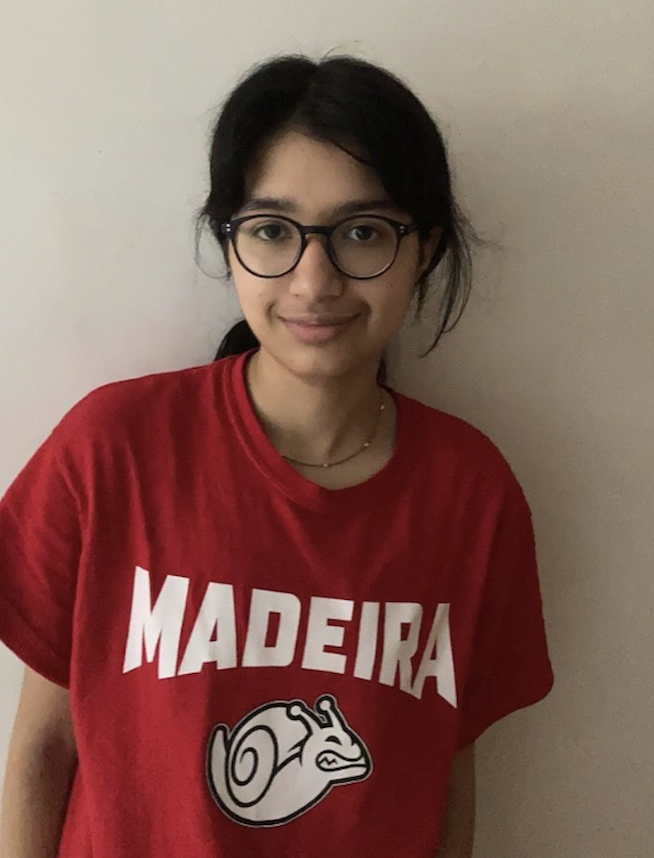
Urvashi is a senior at The Madeira School in Mclean, VA. She has been volunteering with Sahiyo since 2020, and is looking forward to taking her involvement one step further through her role as editorial intern. As an aspiring doctor, she has a keen interest in women’s health and feels excited and privileged to learn, raise awareness, and amplify the voices of women whose stories must be heard. What was your experience of learning about FGC for the first time like?I was fourteen and had just finished reading Alice Walker’s Possessing the Secret of Joy. Like most reactions to learning about the existence of this practice, mine too was a deeply disturbed one. More than that, I was confused. Confused about the reasons behind such cruelty towards beautiful bodies. Once I learned about the archaic roots of the philosophy behind it, I began doing research on organisations that were working towards its end! When and how did you first get involved with Sahiyo? I first got involved with Sahiyo in the summer of 2020 as a volunteer. I attended my first FGC study circle and was intimidated by the vast expanse of knowledge that everyone around me seemed to possess. I learned a lot more about FGC (including the fact that using the acronym FGC is a more sensitive alternative to FGM) during that session, and my initial lack of knowledge and closeness to the subject made me that much more determined to contribute in whatever capacity possible. What does your work with Sahiyo involve? As an Editorial Intern, my work mainly involves blog outreach and development. I get to reach out to people from all around the world and ask them for their input on our blog! Other than that, I also help with editing our website, publishing new stories and Sahiyo updates, and managing the newsletter. Recently, I got to conduct Sahiyo’s first Zoom interview with a Bhaiyo (male ally) who provided me with an important story and insightful conversation. You can read more about his story here! How has your involvement with Sahiyo impacted your life? My involvement with Sahiyo has taught me how to explore sensitive subjects in conversation, be kind and gracious in my approach, and has even reinforced my aspiration of studying medicine! I’m so glad I was able to get involved in the capacity that I have. I hope to be part of the community forever. What words of wisdom would you like to share with others who may be interested in supporting Sahiyo and the movement against FGC? I’d tell anyone who was interested in getting involved with Sahiyo to go for it! Learning about the harms perpetuated by this practice may be daunting, frustrating, and disheartening at times, but it is so, so rewarding to see yourself making even the smallest of differences.
Volunteer spotlight: Programs intern Trisha Kini
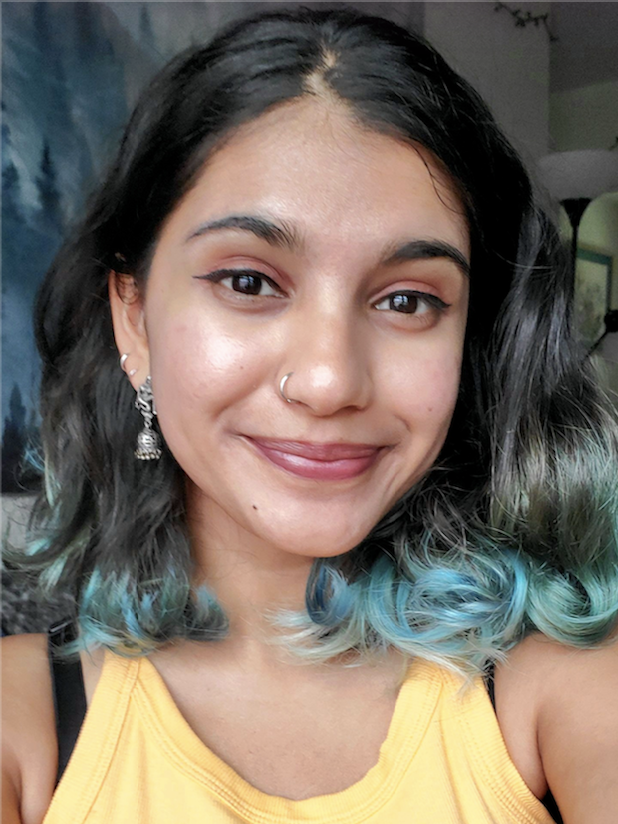
Trisha is a recent graduate of UMass Amherst, with majors in public health and biology. She is passionate about health policy, health equity, and is a strong advocate for women’s rights. She currently works in health policy at a cancer research organization, and hopes to pursue a profession in health law in the future. She believes that intersectional feminism is an important component to addressing gender-based health inequities in healthcare systems, and is looking forward to raising awareness about the severe impacts of gender based violence especially among minority communities. What was your experience of learning about female genital cutting (FGC) for the first time like? I learned about FGC through a college course when we were shown a list of women’s health topics to choose from for a final project. The words “female genital mutilation/cutting” caught my attention as a potential topic because I had never heard about it before. The existence and concept of FGC was foreign to me, though I later learned it actively takes place in my home country, India. As I delved into my research, I was shocked to realize how prevalent, invasive, and harmful the practice is. Understanding the implications of undergoing the practice made me feel angry for the individuals that experience it, as it is another harmful and non-consensual way to prescribe value to women, and those assigned female at birth, through their bodies. When and how did you first get involved with Sahiyo? I got involved with Sahiyo in July 2022, but have had Sahiyo’s website bookmarked since completing my project in 2021, when I first knew I wanted to apply for a position with this organization. I aimed to learn more about the practice through active involvement, and do my part to show up for South Asian and other individuals that are affected by the practice, as well as other forms of gender based violence (GBV). Soon after graduating, I contacted the Programs Coordinator, Cate Cox, and had the honor of joining the Programs team. What does your work with Sahiyo involve? My work with Sahiyo involves collaboration with like-minded, amazing individuals who are passionate about ending FGC and other forms of GBV. As a Programs Intern, I organize webinars through research and speaker outreach, create supporting materials, write reflections/blog posts on previous webinars, and attend events surrounding reproductive justice and women’s rights hosted by other organizations. I’m also very excited to get involved with the other ongoing projects at Sahiyo. How has your involvement with Sahiyo impacted your life? My involvement with Sahiyo has impacted my life greatly – from the extent to which I have learned about FGC, and the many intersections at play, to defining my own interests and career goals. I admire Sahiyo for the immense amount of effort the organization makes to support survivors while striving to put an end to the practice. Sahiyo allows for me to better understand and reflect on my passion for women’s rights, and has helped me affirm my decision to dedicate my professional journey to the same. Collaborating with the Programs team, and learning about FGC and societal constructs that reinforce the practice, has also given me the space to reflect on the norms we choose to stay silent on as a society. Overall, I am grateful for my experience with Sahiyo and I am so excited to be a part of Sahiyo’s mission to end FGC. What words of wisdom would you like to share with others who may be interested in supporting Sahiyo and the movement against FGC? Start a conversation about FGC with your parents, friends, and peers. Listen to survivors, learn, and get involved whether it is through sharing social media posts, making donations, or volunteering with anti-FGC organizations. Finally, take care of your own mental health as you continue to advocate for the health, safety, and rights of individuals affected by FGC.
Sahiyo volunteer spotlight: Social media intern Olachi Nwagwu
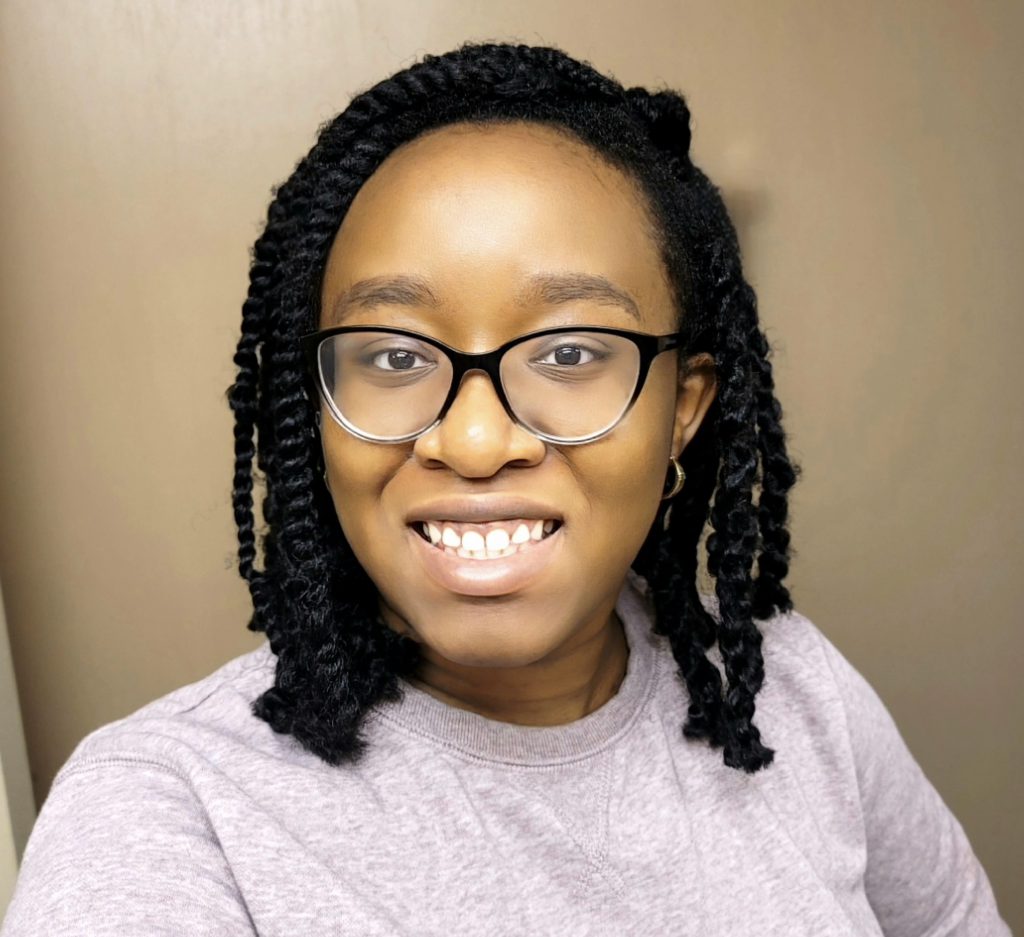
Olachi is a UW-Madison graduate with a Bachelor’s degree in Communications. She is an aspiring entrepreneur and content creator who is passionate about sustainability and community design based thinking. Olachi believes strongly that social media should be used as a tool to help overlooked people in society go from being “invisible” to “visible”. She admires Sahiyo’s mission and hopes to not only learn from, but be a great addition to their multi talented team. What was your experience of learning about female genital cutting (FGC) for the first time? I remember learning about FGC in high school. At that time I subconsciously thought “ah it must be more of a problem in rural areas” and believed it was just a problem of lack of education due to mainly poverty and/or ignorance. I thought that since so many areas were advocating for better education opportunities for girls, it would naturally decrease in time. It was embarrassingly not until I joined Sahiyo that I realized the gravity and the impact of FGM/C around the world. This helped me reflect on issues that I may have subconsciously pushed aside or remained nonchalant about because it was a problem that would fix itself with “government intervention and time”. Now though it is true that societal issues can be lessened with those two factors, I realised ultimately that it might have been another way of me not paying attention to something simply because it did not directly affect me directly. When and how did you first get involved with Sahiyo? I first came across Sahiyo around late March this year. At this time I was actually looking for volunteer work I could do related to Women’s mental health (as I am a huge mental health advocate) and I coincidentally fell on Sahiyo’s page on LinkedIn. I thought the job being offered matched me both skill and interest wise so I applied around April and luckily joined the team as an intern. What does your work with Sahiyo involve? I work as a Social Media Intern where I essentially learn how to manage social media handles, create social media as well as blog content and overall improve Sahiyo’s communication presence. How has your involvement with Sahiyo impacted your life? I feel the most important thing that I have learned while working with Sahiyo is that one needs to constantly reflect and check themselves for any hidden or un-addressed biases due to things like privilege or difference in way of life. In my case it was my lazy nonchalance for FGM/C issues and survivors by simply chalking it up to just a class issue and not complex issue that comprised of class AND culture. Working with Sahiyo also helped me learn about non-binary and trans men who could also be survivors but were ultimately invisible when discussions about FGM/C occurred. This overall helped me gain a deeper understanding of how the concepts of intersectionality and representation can and should look like when being discussed within a topic. What words of wisdom would you like to share with others who may be interested in supporting Sahiyo and the movement against FGC? I strongly admire FGM/C survivors and activists who tirelessly spread awareness on this topic. I would like to especially reach out to those who may not be in FGM/C practicing communities and encourage them to reach out to Sahiyo for informational guides and resourceful ways to support the movement against FGM/C. In several cultures, being assigned female at birth usually means being constrained and even hurt because of what our perceived gender/sex is assumedly supposed to conform to. Because of this, it is even more imperative that we all stand up for one another no matter where we come from.
Reflections on research: Digital Storytelling as a narrative intervention for survivors of FGM/C

Sahiyo volunteer spotlight: Development intern Avery Boudreau
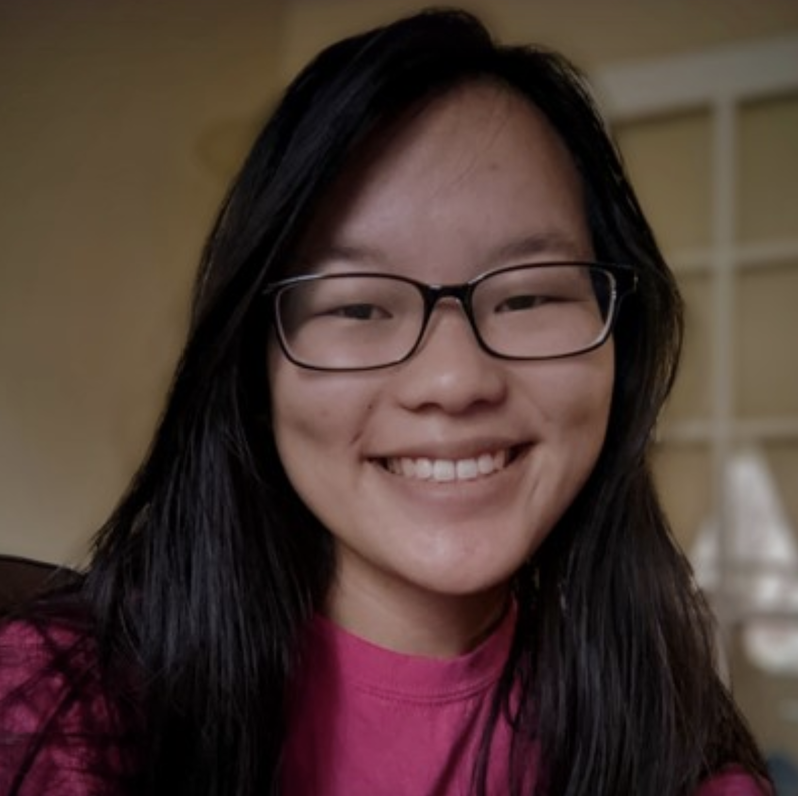
Avery is currently pursuing an undergraduate degree from the University of North Carolina at Chapel Hill in statistics and economics. She is passionate about women’s and animals’ rights, international education, and environmental sustainability, and hopes to utilize her research skills to analyze data and diction to create change and conversations in these areas. She is eager to further her understanding of the practice of female genital cutting (FGC) and excited to utilize her experience in fundraising to help advance Sahiyo’s mission of ending FGC. What was your experience of learning about female genital cutting (FGC) for the first time? In school I know I must have heard about FGC briefly, but I didn’t think much of it. It wasn’t until last year, when I studied abroad for a semester in Egypt, that I fully understood what FGC was. While abroad, I became close friends with a girl just a few years younger than me who was also going to the same university. During one of our many friendly, deep conversations, she shared her experience of undergoing FGC with me. This was shocking, as I hadn’t even thought about a classmate or friend having to endure this human rights violation, since I erroneously thought it was no longer practiced. After looking up more information about FGC, I realized it was much more prevalent than I thought. This led me to look up more resources about FGC and to see if there were ways I could get involved with helping to spread awareness, eventually bringing me to Sahiyo. When and how did you first get involved with Sahiyo? I started getting involved with Sahiyo in February of this year. I learned about Sahiyo from the website and saw examples of the great work that the Sahiyo team and our network has been doing in the movement to end FGC. Throughout college and high school, I had been eager to volunteer whenever I got the chance. In the past, I had volunteered at college and local non-profit organizations that were focused on a myriad of issues such as health, the environment, community, and homelessness, and with my skills and background, I thought I could be helpful to the team at Sahiyo. After learning about the powerful work Sahiyo does, I was excited to get started! What does your work with Sahiyo involve? I am a Development Intern at Sahiyo, so my position is to provide assistance to the Development Team and Coordinator regarding Sahiyo’s organizational development and fundraising initiatives. This includes working on grant applications to ensure Sahiyo has funding to carry out our important programs, creating monthly donation appeals (you’ve probably seen a few emails from me already!), and searching for potential funding opportunities. It has been very rewarding to learn more about Sahiyo’s programs, the individual people and activists within Sahiyo’s community and their powerful stories, and the generous funders/foundations who have been supporting Sahiyo. How has your involvement with Sahiyo impacted your life? My involvement with Sahiyo has widened my perspective on gender-based violence and FGC, and working alongside these amazing people within Sahiyo’s network has inspired me. I am in awe of the resilient survivors and empowering female activists who have worked tirelessly to end this injustice through the innovative ways of storytelling and dialogue. I am thankful for the opportunity to become more educated in gender-based violence and FGC. I am excited to have learned how to be an effective ally, and I know my time helping Sahiyo is just the start of my volunteerism in this field. What words of wisdom would you like to share with others who may be interested in supporting Sahiyo and the movement against FGC? I would like to share with others that anyone and everyone has the ability to help us in the movement to end FGC. I am not from an FGC-practicing community, nor am I a survivor, but there are many ways to support Sahiyo and create a critical mass of people and voices calling for the elimination of FGC. After reading posts from the #EachOneReachBhaiyo campaign, I realized it really can take a conversation to raise awareness about FGC, and if we can all do this collectively, our actions can put an end to FGC. Sahiyo has several informative resources on the website for anyone who is interested in supporting our organization and the movement against FGC, and I would highly encourage everyone to check them out!
